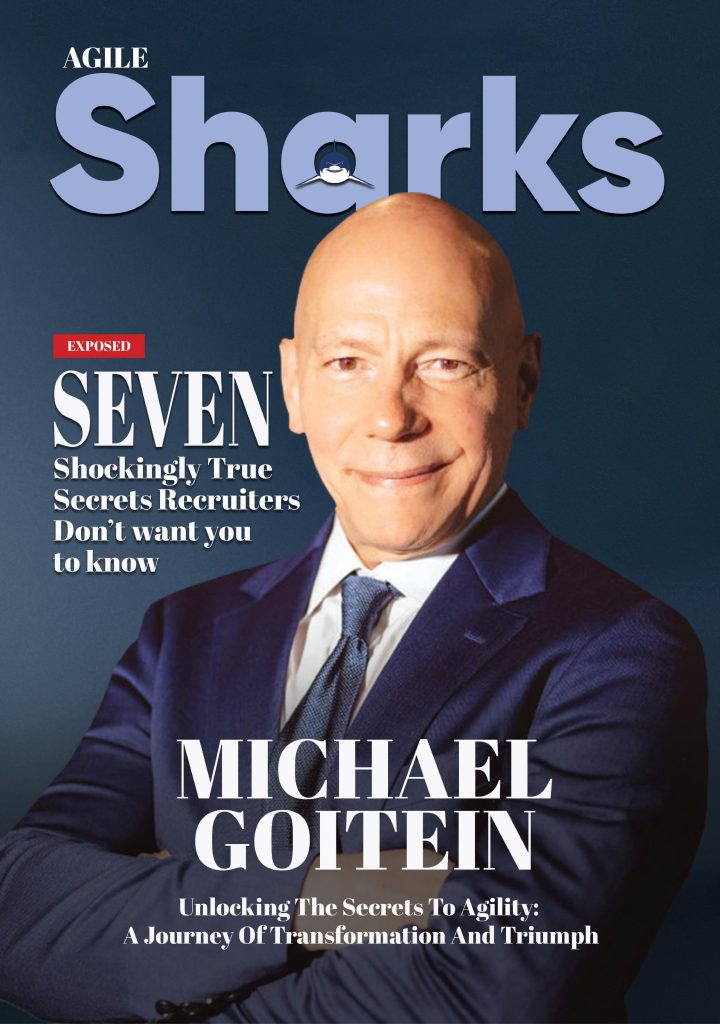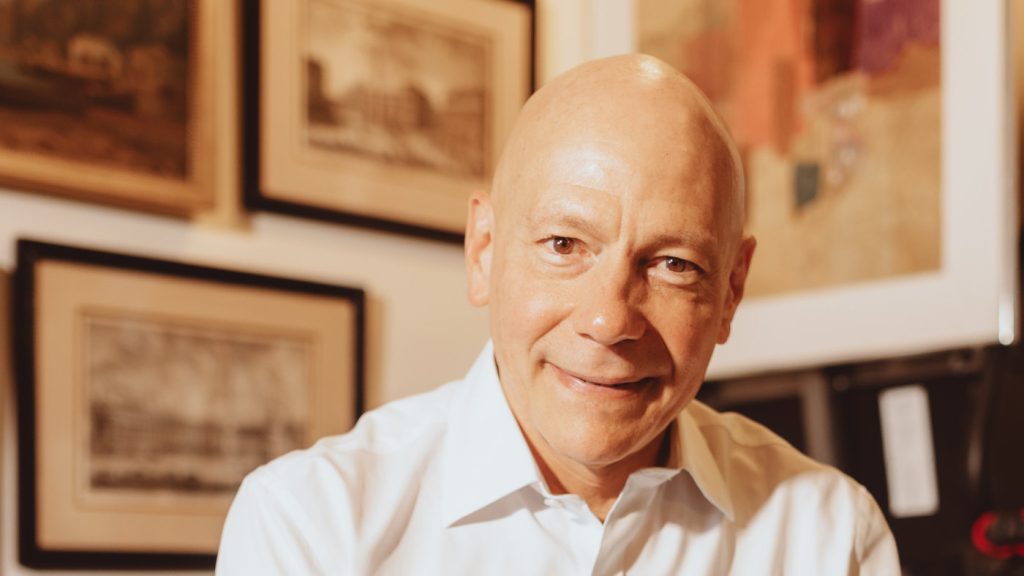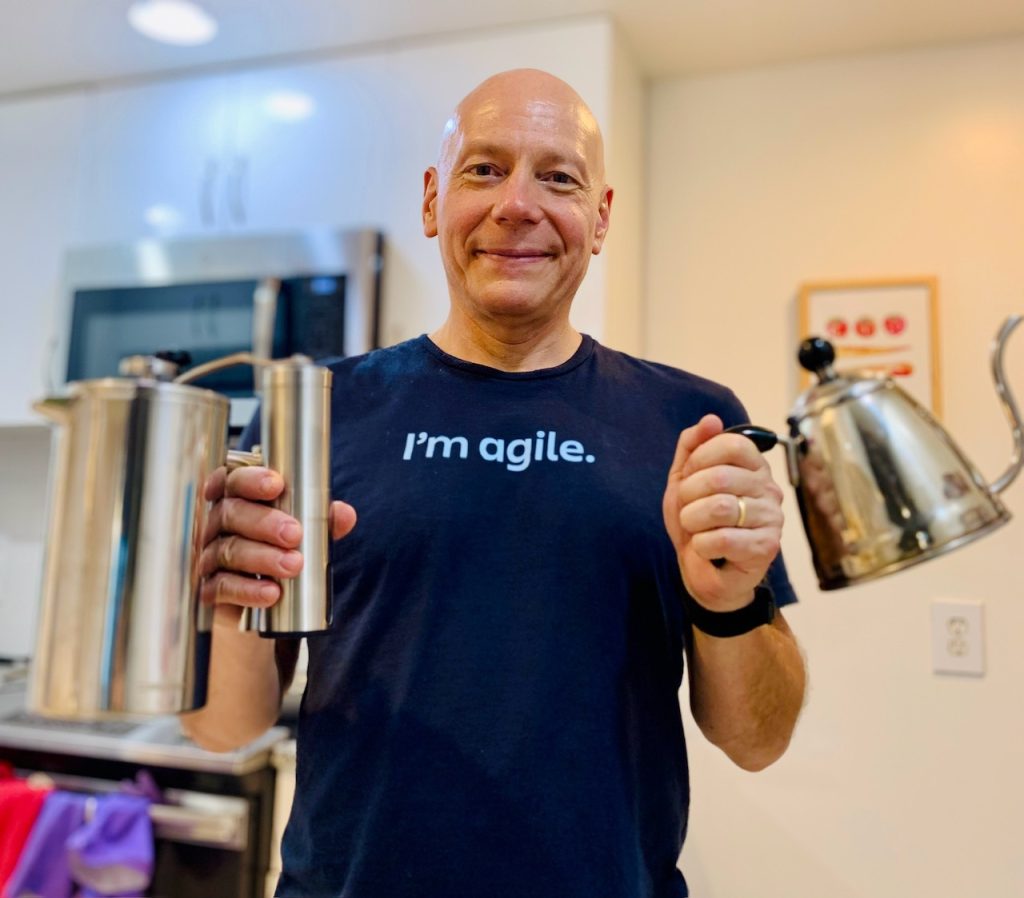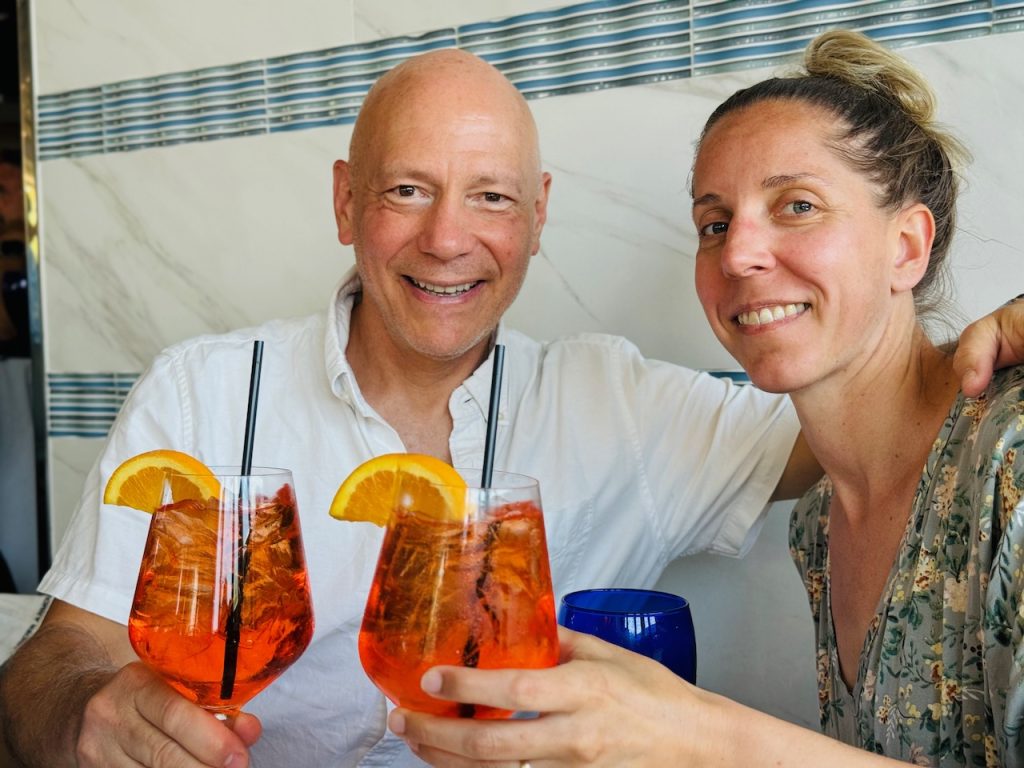
Imagine being born amidst the historic splendor of Rome to Italian and German parents, only to find yourself growing up in the dynamic hustle of New York City. This whirlwind of cultures, languages, and experiences is the backdrop to Michael Goitein’s extraordinary life, a journey that has shaped him into one of the most influential voices in the world of Product Strategy and OKRs.
In this exclusive cover story for Agile Sharks Magazine, we sit down with Michael Goitein to uncover the profound influences that have driven his career and personal growth. From the streets of Rome to the skyscrapers of New York, Michael’s unique upbringing has cultivated a perspective that is both global and deeply introspective. Encouraged by his parents to embrace individuality and a relentless pursuit of learning, he has mastered five languages and developed a knack for understanding diverse viewpoints.
As a seasoned professional who has evolved from various project management roles to becoming one of the top 12 global OKR thought leaders, Michael’s career is evidence of the power of strategy and continuous discovery.
But what drives him to focus on this area? How did a natural comfort with leadership and a talent for storytelling lead to his passion for leadership, strategic thinking, and OKRs?
Join us as we unravel the layers of Michael Goitein’s remarkable journey, exploring how his upbringing, career experiences, and strategic insights continue to shape the future of organizational performance management. This is a story of transformation, resilience, and the relentless pursuit of meaningful outcomes in an ever-evolving world.

Reflecting on your upbringing, what was it like for you growing up, and how do you believe it has influenced the person and professional you are today?
I was born in Rome to Italian and German parents, and then immediately moved to New York City. That unique mix of languages, places, and cultures had a huge impact on me growing up. I didn’t always fit in, but fortunately, my parents encouraged me to embrace my individuality and always value learning and improving. They relentlessly supported me wherever my personal and professional curiosity led, which has helped me learn 5 languages and understand different points of view.
Your career journey has seen you progress through various project management roles to becoming a Director of Project Management, Senior Project Manager, and Principal Project Manager to Agile, Product, Strategy and OKR coach. I’m curious to know why you’ve chosen to focus on Strategy, Continuous Discovery, and OKRs. What sparked your interest in each of these disciplines?
I would say it starts from a natural comfort with leadership. From the beginning of my professional career, I felt comfortable leading, and people looked to me to figure out how to sequence and prioritize things to achieve a result. I’ve continued to refine that ability to effectively manage and direct group efforts. So much of it comes down to creating a shared sense of purpose through storytelling.
It also became apparent to me that a tremendous amount of effort was being wasted on activities that should never have been done. This led me to take two years to get certified in Human-Centered Strategy.
So, the arc is to start with strategy and goals through OKRs and effectively manage and orchestrate the people and products to bring that strategy to life.
It’s been a gradual personal evolution from “Project” to “Product” and “Planning” to “Strategy,” which has helped me make greater progress from just shipping “Outputs” to being able to create meaningful “Outcomes” and “Business Impact.”
Congratulations on being recognized as one of the top 12 global OKR thought leaders by Profit.co! What does this recognition mean to you personally and professionally?
It’s truly an enormous honor, but it speaks more to the community around OKRs than anything else. The only way I became grouped together with the industry’s leading OKR thinkers was because of their support and generosity as I was practicing, learning, and studying. I feel it’s something I need to pass on. I’m conscious of needing to continue to raise my level in every coaching session I do and with every article I write. I do believe the list underrepresented women and a more diverse group of thought leaders, and I’ve continued to bring attention to their work. I’ve also continued to support the next generation of strategy and OKR thinkers.
Can you share your journey and experiences that have led to this prestigious recognition in the OKR community? What pivotal moments or achievements do you attribute to this honor?
Four key things led to this recognition, one of which I touched on above:
First and foremost, community. The OKR community has been tremendously generous and supportive. I’d like to single out Quantive’s global “Dreams with Deadlines” community, of which I was a founding member, as a big part of my development and understanding. I developed friendships there and am still in touch with people today.
Next was deep learning. I got two certifications, from Workboard’s “Outcome Mindset” coach training and from OKR International’s OKR coach certification training.
Third, was practice in challenging environments. As I was doing this training, my nearly 200-year-old organization adopted OKRs as part of a broader transformation, and this offered an incredible opportunity to be on the front lines, helping people make the shift to new ways of setting goals and achieving outcomes.
And fourth, was writing. I started documenting my journey and the insights I was gaining as part of my learning and practice. This helped me start a dialog with a global community and led to my being invited to speak on podcasts, at conferences, and to do consulting and coaching both for other divisions within my own organization, as well as with some other startups.

Bringing OKRs to a nearly 200-year-old organization must have been quite a journey. What were some of the most significant challenges you faced in achieving buy-in and alignment across teams, and how did you overcome them?
Developing software in a legacy, publicly traded financial institution means we have to navigate a very complex regulatory environment. We are measured and audited on everything, including the goals we set. This inevitably gives rise to a very heavy planning and project management-oriented culture. It’s on a range, right? There are pockets of every org that will be open to trying something new and doing so in a secure and sensible way. And there will always be people who will have a harder time adopting new approaches. It’s a constant approach of meeting them where they are and finding out what will help them make that leap to the next level of client-centricity and outcomes-thinking. And look, sometimes people are unable to make that leap. In leadership, we don’t give up on anyone, but we do have a saying “Do everything you can to help a person change, but if they can’t, or won’t, change the person.”
“OKRs have helped lead us to 10x growth, many times over. They’ve helped make our crazily bold mission of ‘organizing the world’s information’ perhaps even achievable. They’ve kept me and the rest of the company on time and on track when it mattered the most.” Despite this testimonial from Larry Page, CEO of Alphabet and co-founder of Google, several organizations still struggle to adopt the OKR framework due to their traditional or hierarchical structures. How can OKRs be adapted to fit different organizational cultures and contexts?
I think Google had little in place in terms of established structures and hierarchies, so they had nothing to protect. OKRs helped them use creativity and client-centricity to set and achieve moonshot goals that led to 10x products in so many key areas. Their biggest breakthrough was figuring out how to “sell” words through their revolutionary AdWords product. So while OKRs had a seat on that rocket ship, a great deal of invention, creativity, and luck were also behind their success.
OKRs work best when they’re used to spur bold innovative thinking and products. So for OKRs to fit traditional hierarchies, they excel when used to set goals for scrappy, lean “startups” within the larger org, areas responsible for next-gen innovation and product development. In banking, we focus on reliability above all. Responsibly managing client funds and being their trusted partner to help them achieve their financial goals requires a massive investment in doing many things consistently right daily. We have made substantial investments in moving to the cloud, which will help us improve reliability and scalability, and we have used OKRs for those efforts.
In one of your articles, you mentioned that strategy, not Agile, is the missing key to business agility. In your interactions with product managers, how do you see organizations often misinterpreting or underestimating the role of strategy in achieving agility?
Absolutely! It’s a fundamental misconception I haven’t heard anyone else dig into yet. It was only after researching why the largest successful large-scale Scrum implementation happened at Nokia, an organization that failed so spectacularly, that I had an extremely eye-opening journey.
What sets Silicon Valley organizations apart is their focus on client-centricity, user experience, technical excellence, and product management, four areas where Nokia was sorely lacking and where many legacy enterprises still have room to invest and improve.
Looking back, what has been the most rewarding aspect of your career journey so far? Any pivotal lessons learned?
The most rewarding aspect has been a focus on daily writing as part of the four keys to my OKR growth I mentioned earlier: i. Community – Make genuine connections and help people in genuine, non-transactional ways ii. Learning – Invest in great teachers, courses, and mentors iii. Practice – You need to check your thinking on the front lines and engage in real action on the front lines iv. Writing – Brings it all together and helps you make sense of it to reach the next level
If today, you were to ask Andy Grove, the father of the OKR framework, a question about the framework, what would it be?
Andy was a genius on so many fronts, and his legacy still reverberates today in so many ways. He originally conceived of OKRs as a goal-setting and management tool. I would probably ask him how we can ensure that OKRs aren’t abused as project management tools.
What advice would you give to professionals looking to enhance their understanding and implementation of strategy, continuous discovery, and OKRs in Agile environments?
Read up on both the thought leaders that resonate with you most. But also learn from those who you disagree with to give your learning greater depth. Find some simple principles and mental models, and apply them to your daily work. For example, anyone can design a personal strategy using the “Playing to Win” principles to radically improve their effectiveness. Experiment and try different things. And document your journey as you learn.
As a proud family man, how do you balance your professional responsibilities with your family life? What strategies have you found most effective in maintaining this balance?
I’m fortunate because I work from home in a classic 9-5 (occasionally 7:00-6:00) environment. So I make togetherness time with my family a priority. Having boundaries is crucial. Turning off the computer at the end of the workday, and taking walks and regularly doing fun things with the family is crucial to maintaining that balance.
Tennis is one of the major sports you play. It requires strategy, quick thinking, and agility. Do you find any similarities between playing tennis and your approach to project management, Agile methodologies or OKR framework?
That’s a great question. As a tennis coach, I specialized in strategy. I even had the earliest blog on the web about tennis strategy (“Strategic Tennis Concepts,” started in 1997), an area I wrote about for several international tennis magazines. I see close parallels between coach Brad Gilbert’s “Winning Ugly” and Roger L. Martin’s “Playing to Win” strategy frameworks. They both emphasize designing a strategy to maximize your capabilities for a given context. Both frameworks allow you to accomplish more with fewer resources through better-quality thinking.

Looking ahead, what do you envision as the future of OKRs in organizational performance management? How should businesses prepare to leverage OKRs in a post-pandemic and increasingly digital world?
It’s important to recognize that on their own, OKRs can’t really do much of anything. When companies adopt them like this, it turns into the worst form of “hoping.” You can set all the OKRs you want to be an Olympic athlete, but without putting all the pieces in place, it will never happen. But OKRs can be helpful as part of a broader framework focused starting from a client-centric, strategic, and product-driven approach taking advantage of the combined power of great product management, technical excellence, and design to deliver value.
If you were to start your career again, is there anything you would do differently when it comes to implementing strategy, continuous discovery, and OKRs?
I would have written more consistently sooner and done the necessary study in strategy and continuous discovery sooner and with more teams. OKRs could have helped to give us a shorthand for our strategy and our progress against it.
How do you stay current with the latest trends and advancements in project management and Agile methodologies? Are there any resources or practices you would recommend to other professionals?
There are so many great organizations and learning opportunities. I’ve learned a great deal from the team at LeadingAgile. Their thought leadership is deep, and they’ve arrived at many of the same insights I have around strategy, product management, and client-centricity. There are many great thought leaders on Strategy, OKRs, Product, and Continuous Discovery writing on LinkedIn, X, and Substack. I’d also recommend people learn other disciplines outside of their own. If you code, learn product management and UX. If you’re a designer, learn to code, etc..
I would like to end my questions with one of the most controversial topics: Is Agile methodology dead or dying?
CapitalOne has led here, as in many other areas. By firing everyone in the Agile job family, they signaled we’ve arrived in a “post”-Agile world. The pressure is really on Agile Coaches and Scrum Masters to provide measurable value to their organizations. It’s no longer enough to criticize teams for not doing “Scrum” correctly, according to the Scrum Guide. Broadening your skill set to include other disciplines – Product Management, UX, Strategy, Engineering – can help Agile Coaches and Scrum Masters bring greater agility while still contributing directly to measurable value creation.

